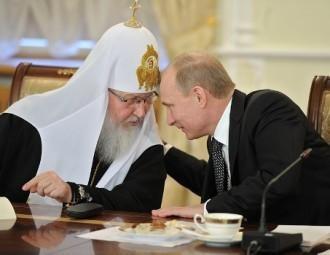Opinion: God is dead in Belarus

Celebration of the anniversary of Kievan Rus’ and the Eastern Orthodox Church’s Christianization is a platform for Post-Soviet reintegration into the Eurasian Union in 2015, writes Aleś Banecki.
This is exactly what Patriarch of Russian Orthodox Church Cyril I of Moscow and Lukashenka jointly stated in Minsk during this celebration.
In today’s Belarus, the Orthodox Church is just another political instrument in the hands of its unchangeable for 19 years ruler Lukashenka. It supports and promotes his regime and its ideology. We could recently observe how the anniversary of the Christianization of Kievan Rus’ in Belarus and Ukraine was used as an occasion for the Russian Orthodox Church to revive and promote closer links between the peoples of the former USSR, thus keeping them, their mentality and way of life inside the so called “Russian World”, even when it comes to a spiritual life, which affects the minds of people believing in God the most.
It is obvious today that Russian Orthodox Church is skilfully used by Kremlin as an instrument of mass-scale propaganda favouring solely the interests of Russian political elites and promoting the idea of Post-Soviet reintegration. The celebration of 1025 years of Christianization of Kievan Rus’ has demonstrated a total dependence of Post-Soviet church and its true role in today’s Belarus, Ukraine and Russia. It is totally dependent on politicians and serves only their interests.
Lukashenka’s recent statements concerning degradation of the Western Civilization, its morality and spirituality is nothing more, but a reflection of current processes in today’s Belarus, Ukraine, Russia and other Post-Soviet states, where even God became a hostage of corrupt politicians and their inglorious deeds. Let’s not forget that Lukashenka himself is not a believer, frequently calling himself an atheist. Nonetheless, for such a handy and politically fruitful occasion, it is obviously not a problem for him to become one and praise God these days.
How can a church representing God cooperate with a bloody dictator and a criminal, helping him to fool and manipulate people for his political intentions? How can one trust such a church afterwards? This is unimaginable in any civilized, moral and spiritual community, but in Belarus people are nothing else but victims of propaganda and numerous manipulations even when it comes to such sacred matters as church, religion and faith in God.
-
03.01
-
07.10
-
22.09
-
17.08
-
12.08
-
30.09



























